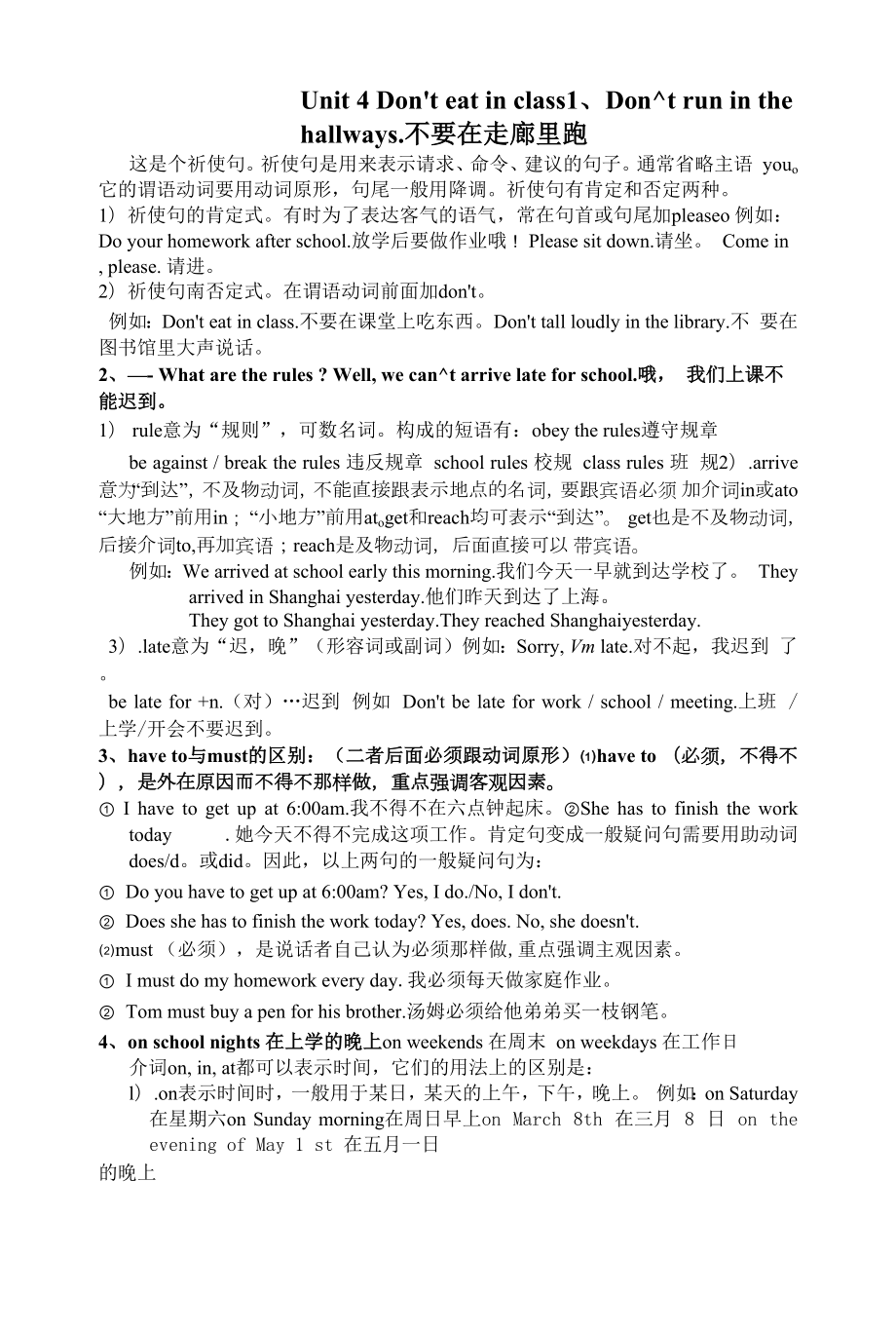《Unit4知識(shí)詳解與訓(xùn)練 人教新目標(biāo)七年級(jí)英語下冊(cè).docx》由會(huì)員分享���,可在線閱讀��,更多相關(guān)《Unit4知識(shí)詳解與訓(xùn)練 人教新目標(biāo)七年級(jí)英語下冊(cè).docx(4頁珍藏版)》請(qǐng)?jiān)谘b配圖網(wǎng)上搜索�����。
1���、Unit 4 Don't eat in class1、Don^t run in the hallways.不要在走廊里跑
這是個(gè)祈使句。祈使句是用來表示請(qǐng)求���、命令�����、建議的句子��。通常省略主語 youo它的謂語動(dòng)詞要用動(dòng)詞原形��,句尾一般用降調(diào)���。祈使句有肯定和否定兩種。
1)祈使句的肯定式���。有時(shí)為了表達(dá)客氣的語氣����,常在句首或句尾加pleaseo 例如:Do your homework after school.放學(xué)后要做作業(yè)哦��! Please sit down.請(qǐng)坐���。 Come in , please. 請(qǐng)進(jìn)���。
2)祈使句南否定式�����。在謂語動(dòng)詞前面加don't����。
例如:Don't eat in
2��、 class.不要在課堂上吃東西����。Don't tall loudly in the library.不 要在圖書館里大聲說話�。
2、—- What are the rules ? Well, we can^t arrive late for school.哦��, 我們上課不能遲到�����。
1) rule意為“規(guī)則”�,可數(shù)名詞。構(gòu)成的短語有:obey the rules遵守規(guī)章
be against / break the rules 違反規(guī)章 school rules 校規(guī) class rules 班 規(guī)2).arrive意為“到達(dá)”��,不及物動(dòng)詞,不能直接跟表示地點(diǎn)的名詞����,要跟賓語必須 加介詞i
3、n或ato “大地方”前用in���; “小地方”前用atoget和reach均可表示“到達(dá)”�。 get也是不及物動(dòng)詞��,后接介詞to,再加賓語��;reach是及物動(dòng)詞��,后面直接可以 帶賓語��。
例如:We arrived at school early this morning.我們今天一早就到達(dá)學(xué)校了����。 They arrived in Shanghai yesterday.他們昨天到達(dá)了上海。
They got to Shanghai yesterday.They reached Shanghaiyesterday.
3).late意為“遲�,晚”(形容詞或副詞)例如:Sorry, Vm late
4、.對(duì)不起���,我遲到 了����。
be late for +n.(對(duì))…遲到 例如 Don't be late for work / school / meeting.上班 / 上學(xué)/開會(huì)不要遲到。
3����、have to與must的區(qū)別:(二者后面必須跟動(dòng)詞原形)⑴have to (必須,不得不)�����,是外在原因而不得不那樣做���,重點(diǎn)強(qiáng)調(diào)客觀因素���。
① I have to get up at 6:00am.我不得不在六點(diǎn)鐘起床��。②She has to finish the work today .她今天不得不完成這項(xiàng)工作����。肯定句變成一般疑問句需要用助動(dòng)詞 does/d���?�;騞id��。因此�,以上兩句的一般疑問句
5、為:
① Do you have to get up at 6:00am? Yes, I do./No, I don't.
② Does she has to finish the work today? Yes, does. No, she doesn't.
⑵must (必須)�,是說話者自己認(rèn)為必須那樣做,重點(diǎn)強(qiáng)調(diào)主觀因素。
① I must do my homework every day.我必須每天做家庭作業(yè)��。
② Tom must buy a pen for his brother.湯姆必須給他弟弟買一枝鋼筆����。
4、on school nights 在上學(xué)的晚上on we
6��、ekends 在周末 on weekdays 在工作日
介詞on, in, at都可以表示時(shí)間����,它們的用法上的區(qū)別是:
l).on表示時(shí)間時(shí),一般用于某日����,某天的上午,下午��,晚上���。 例如:on Saturday在星期六on Sunday morning在周日早上on March 8th 在三月 8 日 on the evening of May 1 st 在五月一日
的晚上
2) in用于表示一段時(shí)間或季節(jié)(月份�,年)
例如:in September 在九月 in 2004 在 2004 年 in summer 在夏 天
in the morning / afternoon / e
7、vening 在早上 / 下午 / 晚上 in the day在白天
3) at表示時(shí)刻或某一時(shí)間點(diǎn)�����。
例如:at ten o'clock在10點(diǎn)鐘 at noon在正午 at night在晚上 at Christmas在圣誕節(jié)5��、I have to help my mom make dinner.我必須幫助媽媽做晚餐����。
1) . help在這里做及物動(dòng)詞,后面可直接跟賓語�。常見的結(jié)構(gòu)有:
help sb幫助某人 例如:Please help him.請(qǐng)幫助他。
help sb (to) do sth 幫助某人做某事����。例如:I help him clean the classroom
8、. 我?guī)椭驋呓淌摇?
2) . help還可以做名詞�����,意為“幫助”��,是不可數(shù)名詞�����。
例如:My friends give me lots of help.我的朋友給我許多幫助��。
6�、No talking!禁止講話!公共故所經(jīng)常見到的標(biāo)志����,也是一種規(guī)章制度。它由 no+ v-ing或no+名詞構(gòu)成��,表示“不許做...”��。例如:No smoking!禁止吸煙 No parking!禁止停車 No photo!禁止拍照7> too many意為“太多”�����,后面跟可數(shù)名詞復(fù)數(shù)�;too much意為“太多七后面跟不 可數(shù)名詞。
例如:There are too many flowers in t
9���、he garden.花園里的花太多 了���。
I have too much homework this evening.今晚我的家庭作業(yè)太多了����。
Unit 4 練 習(xí)一�����、英漢互譯
1. 在課上 2.上課到晚了 3.聽音樂4.不得不
friends
bed9 ? no talking
二��、單項(xiàng)選擇
( )
4.不得不
friends
bed9 ? no talking
二�����、單項(xiàng)選擇
( )
5.
放學(xué)后
7 ? learn the piano 10. school nights _
6. meet my
8. be in
listen to
( )
10��、1. Do you know when hethat day?
A. arrivedB. got to C. arrived in
2. We don't have tothe uniforms.
A. wearB. put on
3. music in the classroom.
A. Don't hear B. Can't hear
D. reached
C. have on
D. dress
C. Don't listen
D. Don't
4. Benbreakfast every day.
A. have toB. has to
C. has to hav
11�����、e
D. has
to has
( )
classroom is big. How about?
A. Our, your B. Your, their C. Ours, theirs D. Your, theirsThere are toorules in the school.
D. some
A. many B. muchC. a lot ofYoutell him about that.
A. have not to B. don't have toC. mustn't have to
D. can't
have
( )
8. Don'tin
12�、to the classroom without a teacher.
A. going B. went
C. goD. goes
( )
9. She can't watch TV _
school nights.
A. inB. at
C. onD. \
( )
10. You can't eat
outside.
A. at
B. \C. in
D.
on
三、用適當(dāng)?shù)慕樵~或副詞填空
1���、Don't eatclass.
2�����、We can9t arrive late
class.
3�����、Do your
13����、homeworkschool. 4����、I have to getat six o'clock every
moring.
5、I can't watch TVschool nights. 6�、Listenthe music in the musicroom.
7、 You have to go hometen o'clock.
四����、句型轉(zhuǎn)換
1. Uncle Wang will get to Beijing at 9 o'clock/改為同義句)Uncle Wang willBeijing at 9 o'clock.
2. Do your homework after school.
14、(改為否定句)your homework after school.
3. Peng can speak English very well.(改為一般疑問句并做否定回答)PengEnglish very well? No, he.
4. She has to wear uniform at school.(改為一般疑問句并做可肯定回答)shewear uniform at school? Yes,
she.
5. I have to wash the dishes at home.(對(duì)劃線部分進(jìn)行提問)you have toat home?
五�����、根據(jù)漢語意思完成下列譯文����。
1. 不要在教室里聽音樂���。to music in theclassroom.
2. 我們上課不能遲到。We can*for class.
3. 我從不會(huì)有快樂�,因?yàn)槲壹矣刑嗟囊?guī)—
I neverbecause I haverules in my family.
4. 我不得不幫助我的父親洗車。 Ihelp my fatherhis car.
5. 周末�,我不得不去少年宮學(xué)習(xí)鋼琴。
, Igo to the children's palace to play the piano.
 Unit4知識(shí)詳解與訓(xùn)練 人教新目標(biāo)七年級(jí)英語下冊(cè).docx
Unit4知識(shí)詳解與訓(xùn)練 人教新目標(biāo)七年級(jí)英語下冊(cè).docx

